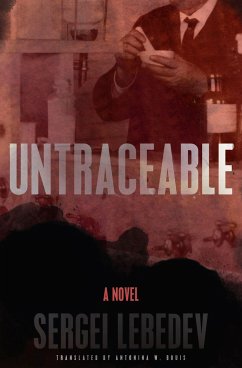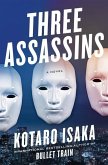For many years, Kalitin has lived alone on the hill, in the house at the end of the road, isolated from his neighbours. He kept for himself, guarded the secrets of his former life, knowing that one day, they would catch up with him. Now, with the cancer in his body, there is not much time left
anyway. His enemies are already on their way, two men, the ordinary set-up, to find and kill him. Agents…mehrFor many years, Kalitin has lived alone on the hill, in the house at the end of the road, isolated from his neighbours. He kept for himself, guarded the secrets of his former life, knowing that one day, they would catch up with him. Now, with the cancer in his body, there is not much time left anyway. His enemies are already on their way, two men, the ordinary set-up, to find and kill him. Agents who turn into angels of death because Kalitin not only knows too much, but because he was the man to develop Neophyte, a highly lethal substance which leaves no trace when applied, perfect to get rid of obnoxious people who know too much or who have fled the secure boundaries of their former home country. Such a behaviour against the code of honour is something Shershnev cannot accept. He has always been hard, hard against himself, hard against his son, hard against everybody. Two men who after a long life in the service of a country which does not exist anymore, have to fight their last battle.
“Kalitin knew that his inventions did not simply create specific weapons of death poured into ampoules. He also produced fear.”
Sergei Lebedev’s novel tells the story of two men who have seen everything in life and for whom life and death have been just states which a person can be in but nothing spiritual. Now, close to the end of their lives, they not only look back but also start to question what they have seen and done. “Untraceable” also tells the story of a lethal weapon we have heard of in the news more than once in the last couple of years. The time of shooting double agents, dissidents, whistle blowers and the like are gone, the strategies and means have become much more sophisticated, but one thing has remained the same: the human factor.
“In that world, most people did not yet see the dark side of science, its evil twin.”
For Kalitin, science, the discoveries and expansion of his knowledge about how nature works have always been paramount. However, he has come to understand that the leaders of the URRS for whom he worked had a different understanding and that, first and foremost, the individual scientist wasn’t worth much. He was only an obedient soldier on duty for the state. Surely, they gave him the opportunity to work in his lab, but at the end of his life, he also sees the price this came with and he can see the bigger picture. He wasn’t interested in politics, he has always seen himself just as a scientist, but eventually, he has to acknowledge that it isn’t so simple and that he cannot put the blame only on the others.
Shershnev, too, ruminates about his life which he has fully dedicated to the long gone state. He is one of the last still on duty who have lived in the USSR and who still, after all those decades, adheres to the old values. He has to admit having made mistakes. Big mistakes which haunt him now. Yet, he follows the assigned mission stubbornly, too weak to make a courageous decision himself.
The beginning was a bit slow, I didn’t get the connection between the different characters and chapter immediately. However, as soon as the main conflict was laid out, the novel was not only suspenseful but also morally challenging since it raises the big issue of science and the responsibility of the scientists. Additionally, it is no question that the former USSR was a rogue regime, yet, no system is flawless and to what extent each civil servant, soldier or simple citizen complies with given values and rules has to be answered individually.
A thrilling political thriller which also offers a lot of food for thought.








